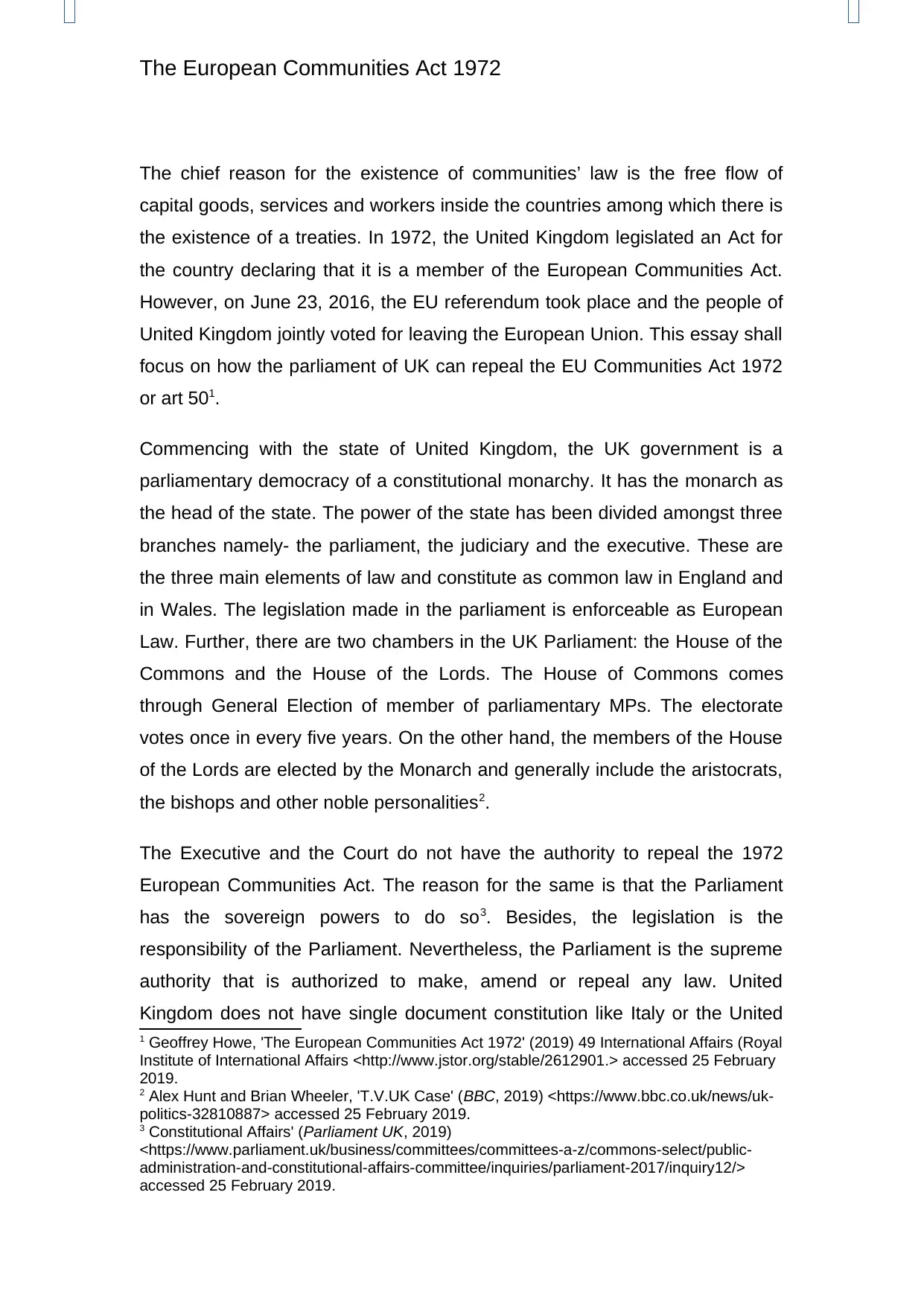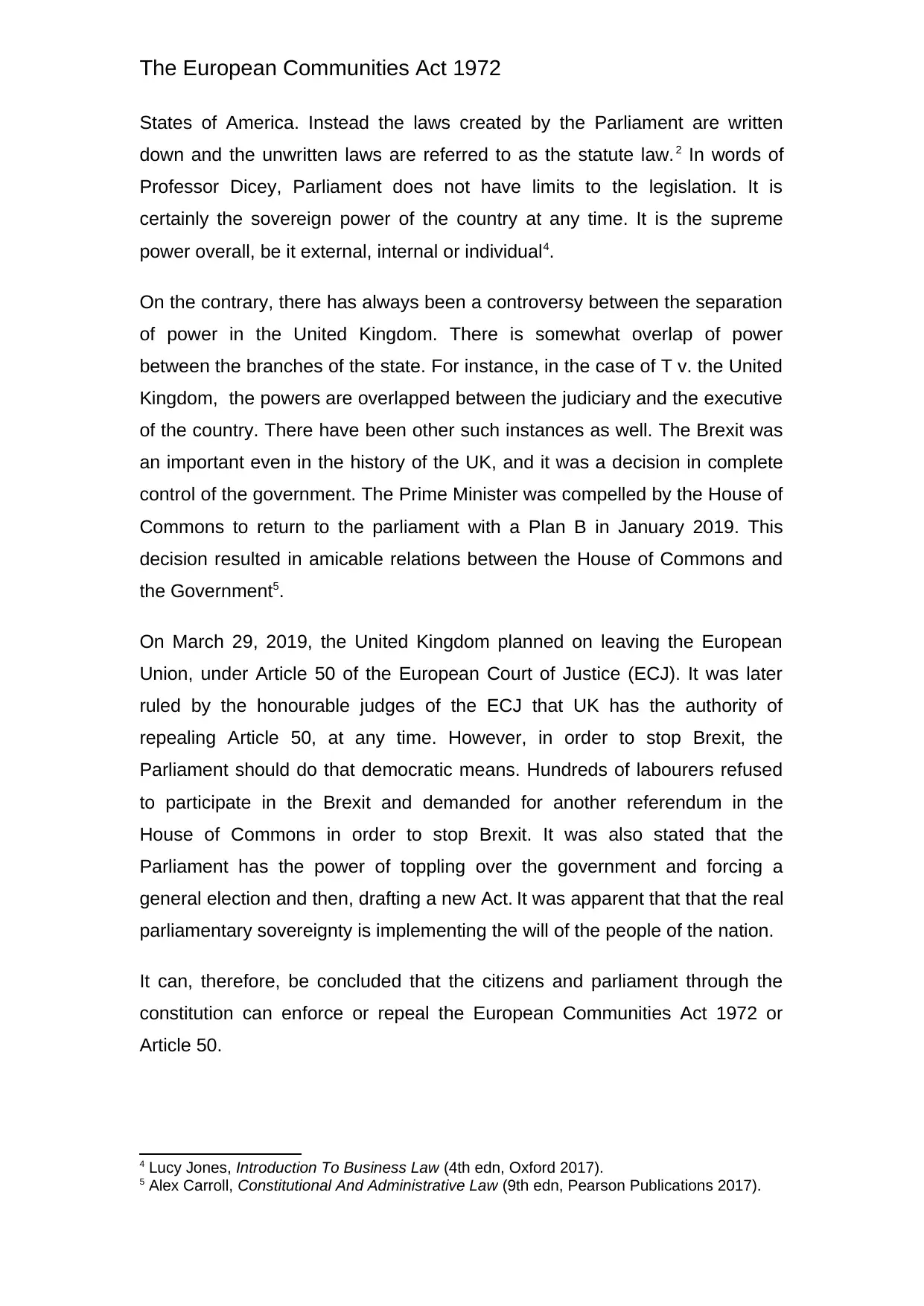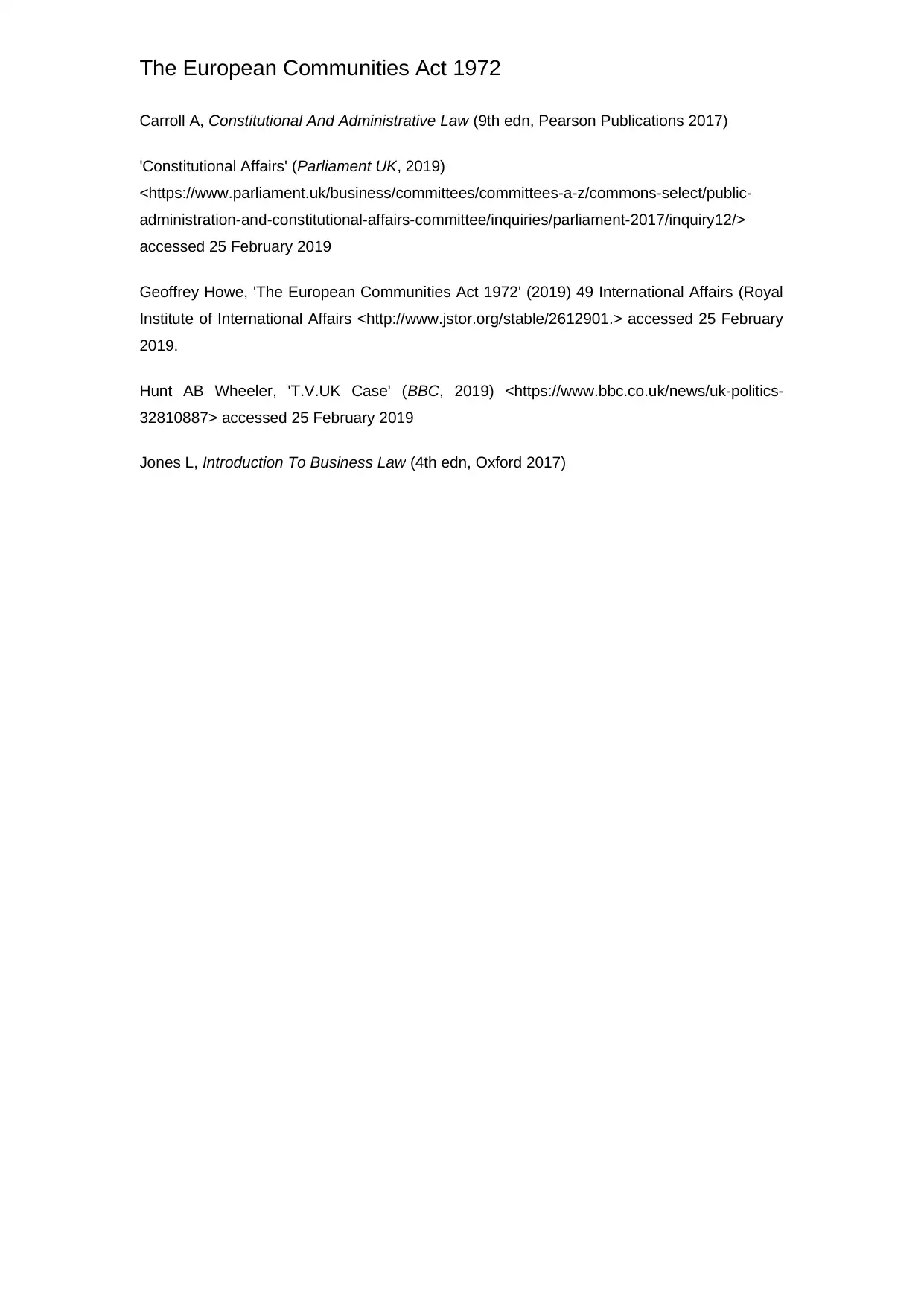Anglia Ruskin University: European Communities Act 1972 Essay
VerifiedAdded on 2023/04/22
|5
|963
|430
Essay
AI Summary
This essay examines the European Communities Act 1972, focusing on the UK's membership in the European Union and the subsequent Brexit referendum. It delves into the UK's parliamentary democracy, constitutional monarchy, and the separation of powers among the parliament, judiciary, and executive branches. The essay explores the Parliament's sovereign power to legislate, amend, or repeal laws, including the 1972 Act. It discusses the implications of Article 50 and the ECJ's ruling on the UK's ability to repeal it. The essay highlights the role of the House of Commons, the government's accountability, and the importance of parliamentary sovereignty in reflecting the will of the people. Ultimately, the conclusion emphasizes the citizens' and Parliament's authority to enforce or repeal the European Communities Act 1972 or Article 50 through constitutional means.

THE EUROPEAN COMMUNITIES ACT
XXXXXXXXXXX
2/25/2019
Anglia Ruskin University
Sharhan, Amar (Student)
XXXXXXXXXXX
2/25/2019
Anglia Ruskin University
Sharhan, Amar (Student)
Paraphrase This Document
Need a fresh take? Get an instant paraphrase of this document with our AI Paraphraser

The European Communities Act 1972
The chief reason for the existence of communities’ law is the free flow of
capital goods, services and workers inside the countries among which there is
the existence of a treaties. In 1972, the United Kingdom legislated an Act for
the country declaring that it is a member of the European Communities Act.
However, on June 23, 2016, the EU referendum took place and the people of
United Kingdom jointly voted for leaving the European Union. This essay shall
focus on how the parliament of UK can repeal the EU Communities Act 1972
or art 501.
Commencing with the state of United Kingdom, the UK government is a
parliamentary democracy of a constitutional monarchy. It has the monarch as
the head of the state. The power of the state has been divided amongst three
branches namely- the parliament, the judiciary and the executive. These are
the three main elements of law and constitute as common law in England and
in Wales. The legislation made in the parliament is enforceable as European
Law. Further, there are two chambers in the UK Parliament: the House of the
Commons and the House of the Lords. The House of Commons comes
through General Election of member of parliamentary MPs. The electorate
votes once in every five years. On the other hand, the members of the House
of the Lords are elected by the Monarch and generally include the aristocrats,
the bishops and other noble personalities2.
The Executive and the Court do not have the authority to repeal the 1972
European Communities Act. The reason for the same is that the Parliament
has the sovereign powers to do so3. Besides, the legislation is the
responsibility of the Parliament. Nevertheless, the Parliament is the supreme
authority that is authorized to make, amend or repeal any law. United
Kingdom does not have single document constitution like Italy or the United
1 Geoffrey Howe, 'The European Communities Act 1972' (2019) 49 International Affairs (Royal
Institute of International Affairs <http://www.jstor.org/stable/2612901.> accessed 25 February
2019.
2 Alex Hunt and Brian Wheeler, 'T.V.UK Case' (BBC, 2019) <https://www.bbc.co.uk/news/uk-
politics-32810887> accessed 25 February 2019.
3 Constitutional Affairs' (Parliament UK, 2019)
<https://www.parliament.uk/business/committees/committees-a-z/commons-select/public-
administration-and-constitutional-affairs-committee/inquiries/parliament-2017/inquiry12/>
accessed 25 February 2019.
The chief reason for the existence of communities’ law is the free flow of
capital goods, services and workers inside the countries among which there is
the existence of a treaties. In 1972, the United Kingdom legislated an Act for
the country declaring that it is a member of the European Communities Act.
However, on June 23, 2016, the EU referendum took place and the people of
United Kingdom jointly voted for leaving the European Union. This essay shall
focus on how the parliament of UK can repeal the EU Communities Act 1972
or art 501.
Commencing with the state of United Kingdom, the UK government is a
parliamentary democracy of a constitutional monarchy. It has the monarch as
the head of the state. The power of the state has been divided amongst three
branches namely- the parliament, the judiciary and the executive. These are
the three main elements of law and constitute as common law in England and
in Wales. The legislation made in the parliament is enforceable as European
Law. Further, there are two chambers in the UK Parliament: the House of the
Commons and the House of the Lords. The House of Commons comes
through General Election of member of parliamentary MPs. The electorate
votes once in every five years. On the other hand, the members of the House
of the Lords are elected by the Monarch and generally include the aristocrats,
the bishops and other noble personalities2.
The Executive and the Court do not have the authority to repeal the 1972
European Communities Act. The reason for the same is that the Parliament
has the sovereign powers to do so3. Besides, the legislation is the
responsibility of the Parliament. Nevertheless, the Parliament is the supreme
authority that is authorized to make, amend or repeal any law. United
Kingdom does not have single document constitution like Italy or the United
1 Geoffrey Howe, 'The European Communities Act 1972' (2019) 49 International Affairs (Royal
Institute of International Affairs <http://www.jstor.org/stable/2612901.> accessed 25 February
2019.
2 Alex Hunt and Brian Wheeler, 'T.V.UK Case' (BBC, 2019) <https://www.bbc.co.uk/news/uk-
politics-32810887> accessed 25 February 2019.
3 Constitutional Affairs' (Parliament UK, 2019)
<https://www.parliament.uk/business/committees/committees-a-z/commons-select/public-
administration-and-constitutional-affairs-committee/inquiries/parliament-2017/inquiry12/>
accessed 25 February 2019.

The European Communities Act 1972
States of America. Instead the laws created by the Parliament are written
down and the unwritten laws are referred to as the statute law.2 In words of
Professor Dicey, Parliament does not have limits to the legislation. It is
certainly the sovereign power of the country at any time. It is the supreme
power overall, be it external, internal or individual4.
On the contrary, there has always been a controversy between the separation
of power in the United Kingdom. There is somewhat overlap of power
between the branches of the state. For instance, in the case of T v. the United
Kingdom, the powers are overlapped between the judiciary and the executive
of the country. There have been other such instances as well. The Brexit was
an important even in the history of the UK, and it was a decision in complete
control of the government. The Prime Minister was compelled by the House of
Commons to return to the parliament with a Plan B in January 2019. This
decision resulted in amicable relations between the House of Commons and
the Government5.
On March 29, 2019, the United Kingdom planned on leaving the European
Union, under Article 50 of the European Court of Justice (ECJ). It was later
ruled by the honourable judges of the ECJ that UK has the authority of
repealing Article 50, at any time. However, in order to stop Brexit, the
Parliament should do that democratic means. Hundreds of labourers refused
to participate in the Brexit and demanded for another referendum in the
House of Commons in order to stop Brexit. It was also stated that the
Parliament has the power of toppling over the government and forcing a
general election and then, drafting a new Act. It was apparent that that the real
parliamentary sovereignty is implementing the will of the people of the nation.
It can, therefore, be concluded that the citizens and parliament through the
constitution can enforce or repeal the European Communities Act 1972 or
Article 50.
4 Lucy Jones, Introduction To Business Law (4th edn, Oxford 2017).
5 Alex Carroll, Constitutional And Administrative Law (9th edn, Pearson Publications 2017).
States of America. Instead the laws created by the Parliament are written
down and the unwritten laws are referred to as the statute law.2 In words of
Professor Dicey, Parliament does not have limits to the legislation. It is
certainly the sovereign power of the country at any time. It is the supreme
power overall, be it external, internal or individual4.
On the contrary, there has always been a controversy between the separation
of power in the United Kingdom. There is somewhat overlap of power
between the branches of the state. For instance, in the case of T v. the United
Kingdom, the powers are overlapped between the judiciary and the executive
of the country. There have been other such instances as well. The Brexit was
an important even in the history of the UK, and it was a decision in complete
control of the government. The Prime Minister was compelled by the House of
Commons to return to the parliament with a Plan B in January 2019. This
decision resulted in amicable relations between the House of Commons and
the Government5.
On March 29, 2019, the United Kingdom planned on leaving the European
Union, under Article 50 of the European Court of Justice (ECJ). It was later
ruled by the honourable judges of the ECJ that UK has the authority of
repealing Article 50, at any time. However, in order to stop Brexit, the
Parliament should do that democratic means. Hundreds of labourers refused
to participate in the Brexit and demanded for another referendum in the
House of Commons in order to stop Brexit. It was also stated that the
Parliament has the power of toppling over the government and forcing a
general election and then, drafting a new Act. It was apparent that that the real
parliamentary sovereignty is implementing the will of the people of the nation.
It can, therefore, be concluded that the citizens and parliament through the
constitution can enforce or repeal the European Communities Act 1972 or
Article 50.
4 Lucy Jones, Introduction To Business Law (4th edn, Oxford 2017).
5 Alex Carroll, Constitutional And Administrative Law (9th edn, Pearson Publications 2017).
⊘ This is a preview!⊘
Do you want full access?
Subscribe today to unlock all pages.

Trusted by 1+ million students worldwide

The European Communities Act 1972
Paraphrase This Document
Need a fresh take? Get an instant paraphrase of this document with our AI Paraphraser

The European Communities Act 1972
Carroll A, Constitutional And Administrative Law (9th edn, Pearson Publications 2017)
'Constitutional Affairs' (Parliament UK, 2019)
<https://www.parliament.uk/business/committees/committees-a-z/commons-select/public-
administration-and-constitutional-affairs-committee/inquiries/parliament-2017/inquiry12/>
accessed 25 February 2019
Geoffrey Howe, 'The European Communities Act 1972' (2019) 49 International Affairs (Royal
Institute of International Affairs <http://www.jstor.org/stable/2612901.> accessed 25 February
2019.
Hunt AB Wheeler, 'T.V.UK Case' (BBC, 2019) <https://www.bbc.co.uk/news/uk-politics-
32810887> accessed 25 February 2019
Jones L, Introduction To Business Law (4th edn, Oxford 2017)
Carroll A, Constitutional And Administrative Law (9th edn, Pearson Publications 2017)
'Constitutional Affairs' (Parliament UK, 2019)
<https://www.parliament.uk/business/committees/committees-a-z/commons-select/public-
administration-and-constitutional-affairs-committee/inquiries/parliament-2017/inquiry12/>
accessed 25 February 2019
Geoffrey Howe, 'The European Communities Act 1972' (2019) 49 International Affairs (Royal
Institute of International Affairs <http://www.jstor.org/stable/2612901.> accessed 25 February
2019.
Hunt AB Wheeler, 'T.V.UK Case' (BBC, 2019) <https://www.bbc.co.uk/news/uk-politics-
32810887> accessed 25 February 2019
Jones L, Introduction To Business Law (4th edn, Oxford 2017)
1 out of 5
Related Documents
Your All-in-One AI-Powered Toolkit for Academic Success.
+13062052269
info@desklib.com
Available 24*7 on WhatsApp / Email
![[object Object]](/_next/static/media/star-bottom.7253800d.svg)
Unlock your academic potential
Copyright © 2020–2026 A2Z Services. All Rights Reserved. Developed and managed by ZUCOL.





